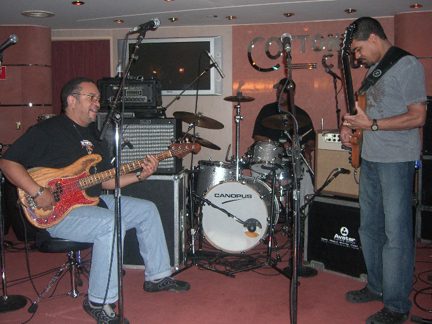
Photo by Annabel Lukins Stelling
For readers who haven’t been on Jam Cruise yet can you talk a bit about what that room’s like?
Well, the Jam Room is one of the smaller rooms where musicians can just go and jam—usually very late at night. But now that it’s getting so popular, they’ve moved it to a bigger room to make it more accommodating—last year it was right in the middle of the ship. I think some of my favorite moments have always happened in the Jam Room. I mean all of the gigs that I’ve done the sets were all great and all fun, but sometimes the best moments are in the Jam Room. There is one moment in particular I wish we had recorded. Myself and Oteil Burbridge were just sitting in chairs—just the two of us—and we’re playing and then Raymond Weber from Dumpstaphunk just came in and got behind the drums. It was just the three of us for the first 30-35 minutes, and we were having so much fun, and before we knew it, the room was just full of people. Other players started coming in and started to jam. I wish I had a chance to hear some of that.
Has a Jam Room session even sparked a more formal collaboration?
Col. Bruce, Grant Green Jr. and I did a Jam Room thing once and then somebody got sick or something, so they called and asked if I wanted to play with the band and fill the gap. I got to meet Grant Green Jr.—that was the first time I met him, and I didn’t think about him as Grant Green Jr., I thought about him as Grant Green [his legendary father]. I never met his father, but his father recorded one of our songs, and we had recorded one of his songs. So when I was introduced to him, I was introduced to him as Grant Green, not Grant Green Jr. and I said, “I’ve been wanting to meet you for 30 years!” Then Col. Bruce starts following down laughing, and Grant Green Jr. says, “No, no you’re talking about my dad.”
You and Col. Bruce only recently started crossing paths, despite coming through the ranks just a few states away from each other. When did you first meet?
I think the first time I met him he was playing with Gov’t Mule. Music is a really funny thing. If you pay attention, you can really learn something. When I sit in with people I have the opportunity to really be part of creating something. I think that’s very important. I know a lot of players that go 110% to make a great impression, but I think the greatest impression when you’re sitting in with people is learning to be a part of something. When I sit in with people, I’m not trying to make a statement. I’m trying to convince someone like John Scofield to take me on one of his jazz runs—I know that I can play it, I just need to convince John to give me a shot at playing it.
Speaking of John Scofield, you played a series of gospel gigs with him earlier this year and will rejoin his The Piety Street Band for some shows next month. It seems like both you and Scofield were using that band as an opportunity to step outside your comfort zones.
I don’t think I was his first choice, but when it came down to the line, he needed a bass player. I think he originally wanted an upright bass player. I’ve always wanted to play jazz, actually—I wish my cousins [Marsalis family] would open the door for me with that. I find that people always call me when they want to make a funk record.
Even Clap Your Hands Say Yeah singer Alec Ounsworth recently hired you, Robert Walter, Stanton Moore and Los Lobos’ Steve Berlin when he wanted to cut a New Orleans record.
That came about through Stanton, I think. Within the last year and a half, I did three projects with Stanton, and I’ve had a great time playing with these guys. I’ve been getting these calls most of my career, for projects, and my performances have opened the window for me to be a producer.


No Comments comments associated with this post